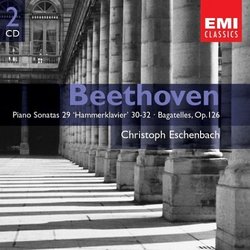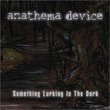| All Artists: Ludwig van Beethoven, Christoph Eschenbach Title: Beethoven: Piano Sonatas 29, 30, 31 & 32; Bagatelles, Op. 126; Christoph Eschenbach Members Wishing: 0 Total Copies: 0 Label: EMI Classics Release Date: 6/1/2004 Album Type: Original recording remastered Genre: Classical Styles: Forms & Genres, Sonatas, Historical Periods, Classical (c.1770-1830), Romantic (c.1820-1910), Symphonies Number of Discs: 2 SwapaCD Credits: 2 UPC: 724358549928 |
Search - Ludwig van Beethoven, Christoph Eschenbach :: Beethoven: Piano Sonatas 29, 30, 31 & 32; Bagatelles, Op. 126; Christoph Eschenbach
 | Ludwig van Beethoven, Christoph Eschenbach Beethoven: Piano Sonatas 29, 30, 31 & 32; Bagatelles, Op. 126; Christoph Eschenbach Genre: Classical
|
Larger Image |
CD DetailsSimilar CDs
|
CD ReviewsTHE BEST HAMMERKLAVIER Milan Simich | 11/07/2006 (5 out of 5 stars) "This album contains the Best Hammerklavier on record. It is just SO RIGHT! in it's pacing. I own 2 copies of the vinyl, just in case I put a scratch on one (not yet!). I have heard many Hammerklaviers, including Rudolf Serkin on a blizzard night at Carnegie on Beethoven's Birthday, if I remember correctly. Had to walk home 2 miles, thru the snow. While Uchida's Hammerklavier at Carnegie a year or so ago was the most exciting, I didn't sleep for 2 nights!... a headlong rush thru the first 2 movements, followed by an Adagio that was even slower than anything that Pogorolich could envision, which made me want to scream 'Move It Along Lady!' and then back to the final movement faster than her fingers could articulate. Also the 2 versions by Francois Frederic-Guy are terrific. There is so much to this Sonata.!!! But Eschenbach's is as I said just right! it's all of a piece and there is no sense of fatigue or piano defeating the pianists as with so many others. (I do think though, that it should be performed on an upright rather than concert grand. On Pianoforte is interesting, but a little jangling...upright would be just right. The other Sonatas are not the same because they are not on the level of the Hammerklavier, but still are terrific performances. Highly Recommended. BTW Eschenbach has been kicked out as artistic Director of Philadelphie, I'm told. Too bad, as I enjoy his conducting, rough as it can be sometimes. Best Berlioz Fantastique I ever heard live with his Orchestra De Paris, or whatever they're called. Anyway, Buy this record. you won't regret it. PS Heard last week Pogorelich in concert do the Opus 111...took 42 minutes, but weird as it was, it was like he was getting the notes dictated directly from Beethoven as he was playing. Fascinating!" A "new" Beethoven pianist in great form Santa Fe Listener | Santa Fe, NM USA | 12/19/2006 (5 out of 5 stars) " These EMi recordings form 1976 and 1978 have been gone for so long (or ot released in the U.S. at all) that they seem new. Eschenbach's career as a pianist was long ago eclipssed by his career as a conductor. Like Barenboim, he's a much better instrumentalist than maestro, and these stunning late sonatas are proof. Eschenbach's personality in these works is heroic, extroverted, and urgent. He's the anti-Arrau. You don't hear a ponderous phrase, nothing is deeply thought, nothing is held in reserve. Some listeners may dislike such a blunt approach, but unlike Pollini, whose late Beethoven sonatas contian more than their share of steely aloofness (much as it pains me to admit), Eschenbach's touch isn't steely or percussive. In the Hamemrklavier, where percussiveness is hard to avoid, he's aided by a warm, sonorous instrument whose treble has a nice bell tone, and EMI's close up recording doesnt' emphasize the sound of the piano's action. I'm not sure that the other sonatas could be called first choices, but if you gravitate to pianists like Pollini and Serkin, Eschenbach is in that class of exciting virtuosos whose sense of riming seems intuitively right." Master's eloquent renderings stand the test of time I. Innes | Australia | 03/01/2008 (5 out of 5 stars) "Beethoven: Piano Sonatas 29, 30, 31 & 32; Bagatelles, Op. 126; Christoph Eschenbach I had a much-loved vinyl recording in the 1970s of Eschenbach's rendering of the Hammerklavier, so my perception of later recordings may always have been coloured by that first encounter. However it is a delight to hear it again, driving forward with feverish energy, perhaps a little fast, but characterised by beautiful shaping of phrases,richly shaded whether at ppp or ff, technically brilliant of course but still retaining an overall sense of control and great musicianship. For me the obvious comparison is with the Kovacevich recording which I own and enjoy, although it seems to me a performance filled with a sense of portent and gravitas. If these qualities are less obvious in the Eschenbach performance the result is no less overwhelming.
Three other sonatas, nos 30,31 and 32, are notable for the introspective style of performance, the Op.109 in particular played with great grace and formal elegance. The transfer from analogue retains a strong sense of warmth and authenticity." |

 Track Listings (7) - Disc #1
Track Listings (7) - Disc #1



